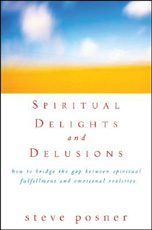"It took me three decades to abandon my own original concept of enlightenment. When I finally dropped my yearning for a future personality that had no anger, disappointment, and desire, I was able to relax into the immediate spiritual calm of my own inner silence.
"But is silence the essence of spirituality?
" 'Silence cannot be equated with spirituality. That is simply not true,' insisted Michael Kagan, a Jerusalem teacher who takes a holistic approach to Judaism. The experience of the quiet stillness within is just one of many spiritual practices that serves as a gateway to the divine, Kagan explains. 'Silence is not in itself spiritual,' he said. 'Experiencing the presence of God is spiritual. Silence simply opens us to this experience.'
"Inner silence can be its own spiritual reward or the door to a variety of religious experiences.
" 'The Father uttered one Word,' wrote St. John of the Cross, the sixteenth-century Christian mystic. 'That Word is His Son, and he utters Him for ever in everlasting silence; and in silence the soul has to hear it.'"Depending on one's own spiritual beliefs, silence may be experienced as a spiritual gift to humanity or a divine blessing from God.
" 'When Lord Buddha speaks about Nirvana, let us think only of silence,' the Hindu guru Sri Chinmoy taught. 'This silence that the Buddhists speak of is nothing other than God, for inside silence we see the whole creation.'
"Whether the experience of inner silence alone is the essence of spirituality or a gateway to the God realization of rabbis, monks, and gurus, the path to fulfillment remains the same: our awareness of the quiet within leads to a profound awakening. This spiritual awakening gives us inner peace. And it gives birth to wisdom.
"Adin Steinsaltz, a renowned expert on the mystical teachings of the Kabbalah, described how insight emerges from silence. 'Often cited in the literature of Chabad Hassidism, is the case of a person struggling with an extremely difficult concept,' he wrote. 'At first, the concept is completely elusive, the mind an utter blank,' Steinsaltz explained. 'Then, suddenly, there comes in a flash the sense that "Eureka! I got it!" If, at this point, we were to stop this person and ask him, "What did you get? What have you understood?" he would be unable to explain anything to us, except that he has grasped the concept.'
"When we accept the blankness within, welcome it, relax into it, and enjoy it, then knowledge dawns. And eureka! We experience a silent moment of insight that is beyond words. What follows this revelation can be analyzed, categorized, and described in different ways. It is the presence of God, says one seeker. It is the unfolding of the true Self, another explains. It is the experience of Unity, others declare. Yet what is common to all of these descriptions is the uplifting experience of the blank stillness within.
"The silent eureka moment can be accessed by all of us — the devout and the faithless, the believer and the skeptic, the inspired and the disillusioned. Some of us still long for a far-off state of nirvana where ecstasy constantly flows. Whether this goal is spiritually realistic or not, the inner stillness needed to attain this state is available to all of us, here and now. As Sri Chinmoy observed, 'Perhaps only one person out of a million or a billion will know what Nirvana is. But everybody knows what silence is.'
"The search for a distant spiritual goal can propel us past what is already possible. We wind up getting trapped by our belief in an exotic state of consciousness, which we assume is capable of turning our daily ups and downs into a lifetime of steady, unalterable bliss. We become ensnared by the future's promise, when the present is all we need.
"There is no shame in having chased the implausible and no contempt for those who still do. A spiritual journey is just that: a movement from one revelation to another. We trade our illusions for insights as we make our way along the path. Let us honor the noble people who seek perfection, who courageously strive for absolute virtue and a ceaseless harmonious future. Yet may the silence of the present also bring them peace.
"My own experience is not the godlike stuff of legendary yogis and mythical sages, but rather the simple awareness of peaceful inner quiet. Absolute virtue and unwavering serenity still elude. Emotions rise and fall, fading in and out. Passions and obsessions emerge, dissolve, reappear, and disappear. Fears grip, release, return, and vanish. Thoughts change — questioning, clarifying, and questioning once again. Spiritual ecstasy comes, but it also goes. Yet a deep, stabilizing stillness endures.
"The eighteenth-century mystical poet William Blake observed, 'Men are admitted into Heaven not because they have curbed and governed their passions or have no passions, but because they have cultivated their understandings.' We can understand that it is the heavenly reality of silence, which hovers beneath our conflicting emotions, that keeps us from falling into hellish despair.
"Inner silence offers salvation because its timeless presence cushions our daily sufferings. Silence is eternal, so it is ever ready to comfort us. Silence has no end, just as it has no beginning. In the beginning was the Word, but before the beginning, before all words, there was nothing. Only silence. What will there be long after the beginning, after the end has come? Only silence. What is left when our thinking and feelings subside? Inner silence.
"We can become aware of our own inner silence any time, anywhere. Silence never disappears. It is the grace that has been bestowed upon every one of us. We don't have to invent silence, manipulate it, or worship it. Silence has been given freely to each of us. All we need to do is put our attention on it."
